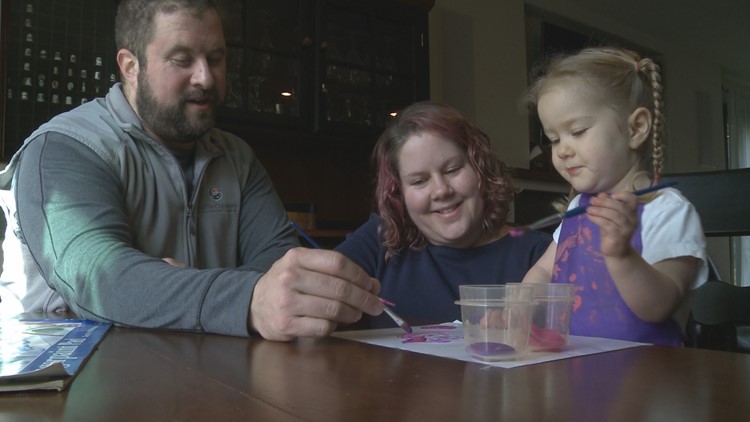The FDA approval of the world's smallest heart valve came after successful surgeries that saved the lives of gravely ill newborns, and a tiny patient at Seattle Children's hospital was the first in the nation to receive the valve during the trial.
Now a toddler, little Sadie is a bundle of energy and doing her part for the evolution of medicine.
Sadie was born with a congenital heart defect that had suddenly turned lethal when she was two months old. She was in complete heart failure and needed a surgery right away.
Parents Wendy and Lee’or Rutenberg looked back through their album of that experience and remembered the moments captured in photos.
“This was the scariest, because there were so many tubes and wires coming out of her,” said Wendy, Sadie’s mother.
But in contrast, the morning we met Sadie was a different story.
That’s because their doctor, Seattle Children’s Chief Cardiac Surgeon Jonathan Chen, had the brilliant idea of installing the smallest heart valve ever used in a newborn.
“She has a congenital problem called atrialventricular canal defect, and that's where you have a big hole in the upstairs chamber of your heart, a big hole in the downstairs chamber, and one common valve between the two,” said Chen.
But at three months old, Sadie was still too small even for the tiniest valve. So, she was kept in the Intensive Care Unit for months, slowly growing so that she would be big enough for the new valve.
“We kept measuring, we kept checking. She was actually in the ICU on a ventilator for almost that entire period of time, and when her valve finally reached the size, like 14 1/2 mm on an echocardiogram, we said, 'Now is the time to go in and replace a valve,'” said Chen.
The new 15 millimeter valve made by Abbott Labs was part of a study to make sure it was safe. Sadie was the first in the nation to receive one as part of that study.
“It was difficult. You don't know if it's really going to work. It's part of the trial. It's not FDA approved,” said Wendy.
“It seems straightforward to take a big valve and make it smaller, but every time you make changes to things like that you do change the risk of a clot forming on the valve in little kids,” said Chen.
The operation was a success, and so was the study with FDA approval for the new mini heart valve.
“For her, you look at her today and you look at this cute little girl. You wouldn't realize that she's been through five open-heart surgeries. Now she's just such a happy, tough, resilient, little girl and she's just got so much energy,” says Lee’or Rutenberg, Sadie’s father.
Sadie has already had a larger valve implanted, and it’s expected she’ll have two more, larger valves as she continues to grow.
“10 years ago, we wouldn't have been able to keep Sadie alive, so this Abbott valve in the clinical trial and the FDA approval means so much to us and helped us have a family,” said Wendy.
“The advantage of having had the halo study and now the FDA approval is that now it can just be on the shelf, and so what's amazing about that is that sometimes we go into the operation thinking the mitral valve is no good, and we're just going to replace it. Other times were saying, we're going to try to repair this, but if we're not successful in making a good enough repair we need something to back us up,” said Chen.
“She'll tell you about how Dr. Chan put a sparkle in her heart, things that you just don't expect from a three-year-old,” said Lee’or.
“I told her parents she could be president of the United States, she can be a couch potato, she can do whatever she wants. Hopefully, she'll become a sullen teenager, and then she'll become a grateful adult, and she'll be right on target with all the other kids,” said Chen
One day soon, stem cells will be harvested and put on a scaffold to make a heart valve, then implanted into the child’s body to function, but it will grow with that child so that they never have to have another transplant.
"How great would that be?" Chen said.



